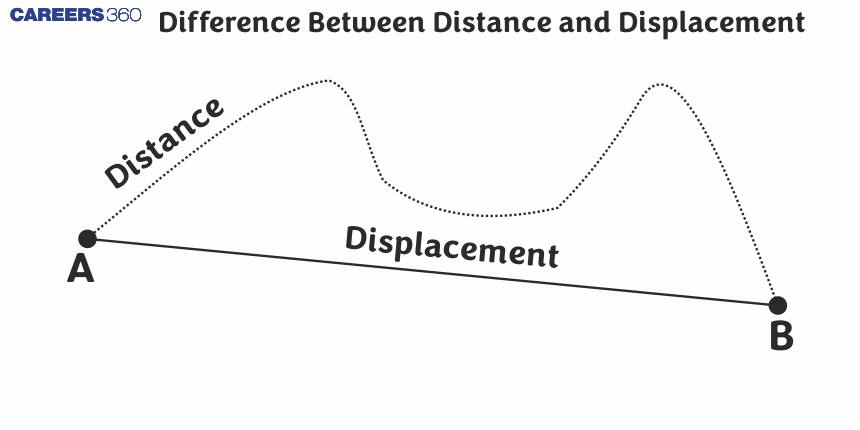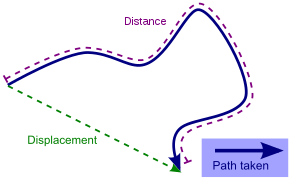Difference Between Distance and Displacement
Distance-
Distance is scalar number, which indicates that distance between two objects is independent of their motion direction. The distance can never be 0 or negative, and it must always be greater than the object's displacement. The object's distance provides detailed information about the path it has taken.
JEE Main 2025: Physics Formula | Study Materials | High Scoring Topics | Preparation Guide
JEE Main 2025: Syllabus | Sample Papers | Mock Tests | PYQs | Study Plan 100 Days
NEET 2025: Syllabus | High Scoring Topics | PYQs
- Distance-
- Displacement-
- What is the difference between Distance and Displacement?


Also read -
- NCERT Solutions for Class 11 Physics
- NCERT Solutions for Class 12 Physics
- NCERT Solutions for All Subjects
Displacement-
Displacement d, also called length or distance, is a one-dimensional quantity representing the separation between two defined points.
Similarities of Distance and Displacement difference-
There are some parallels between distance and displacement difference that you should be aware of-
The units of distance and displacement difference are the same in S.I. units, namely meters (m).
Both measurements necessitate use of reference point.
If the motion of the object is in a straight line and in a single direction, they are equal.
Both distance and displacement have same dimensions.
| Related Topics Link, |
What is the difference between Distance and Displacement?
Differentiate between distance and displacement difference or distinguish between distance and displacement
| Sl. No. | Different properties | Distance | Distance |
| 1. | Definition | The distance between any two points is the total length of the path. | The direct length between any two points measured along the shortest path between them is called displacement. |
| 2. | Denotation | d | s |
| 3. | Direction Consideration | The direction is ignored when calculating distance. | The direction is taken into account when calculating displacement. |
| 4. | Quantity | The magnitude, not the direction, determines the value of a scalar quantity. | Because it depends on both magnitude and direction, displacement is a vector quantity. |
| 5. | Route Information | The term "distance" refers to the specific route information used when travelling from one location to another. | Because displacement only refers to the quickest way, it does not provide entire route information. |
| 6. | Formula | speed × time | velocity ×time |
| 7. | Possible values | Only positive numbers can be used in the distance. | Positive, negative, or even zero displacement is possible. |
| 8. | Measurement in non- straight path | A non-straight path can be used to calculate the distance. | Only a straight road may be used to quantify displacement. |
| 9. | Indication | An arrow does not represent distance. | An arrow is always used to denote displacement. |
| 10. | Path dependence | The distance is determined by the path followed, and it varies depending on the way taken. | Displacement is independent of the path and solely depends on the body's initial and ending positions. |
Also read :
- NCERT solutions for Class 11 Physics Chapter 3 Motion in a straight line
- NCERT Exemplar Class 11 Physics Solutions Chapter 3 Motion in a straight line
- NCERT notes Class 11 Physics Chapter 3 Motion in a straight line
The above table shows difference between Distance and Displacement.
These are the key distinctions between distance and displacement difference that can aid in making a clear distinction between the two. These differences in distance and displacement, presented in tabular form, can help students remember the ideas more easily.
Apart from recognizing the differences between distance and displacement it is also advisable to be well-versed in their connected ideas and have a firm grasp on the fundamentals.
Also check-
- NCERT Exemplar Class 11th Physics Solutions
- NCERT Exemplar Class 12th Physics Solutions
- NCERT Exemplar Solutions for All Subjects
NCERT Physics Notes :
Frequently Asked Questions (FAQs)
The term "distance" which refers to "how much ground an object has covered" during its travel. The overall change in position of an object is described by displacement, which is a vector quantity that describes "how far an object is out of place."
Distance is the length of the whole path taken by the body between the initial and end sites, therefore distance equals displacement if the body moves in a straight line.
Use the distance formula d = s * t, or distance equals speed times time
The length of the line segment connecting two places is called the distance between them. The length of the line segment connecting the specified two coordinates can be used to compute the distance between two points in coordinate geometry.
The shortest distance between the surfaces of two parallel planes is known as the distance between them. Consider this: if the planes are not parallel, they will ultimately intersect. If they cross, they have no distance — 0 distance — between them on that line of crossing.
Also Read
05 Feb'25 04:57 PM
11 Jan'25 03:00 PM
24 Dec'24 01:28 PM
27 Nov'24 01:02 PM
26 Nov'24 01:31 PM
20 Nov'24 04:50 PM
20 Nov'24 12:59 PM
16 Nov'24 01:06 PM
14 Nov'24 04:17 PM
13 Nov'24 11:06 AM